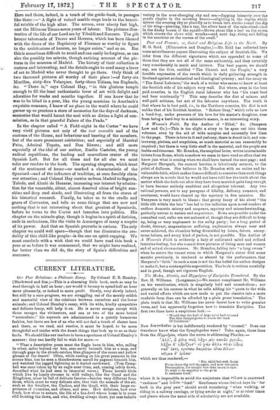The Medea, Alcestis, and Hippolytus of Euripides Translated. By the
Rev. H. Williams. (Longmans.)—We cannot compliment Mr. Williams on his versification, which is singularly bald and unmelodious ; nor generally on his success in what be calls adding his " quota to the wide and varied efforts which are now made to put the classics into a more readable form than can be afforded by a plain prose translation." The plain truth is that Mr. Williams has never learnt how to write genuine verse, and has apparently forgotten how to translate Euripides. The first two lines have a suspicious look :— " Would that the hull of Argo ne'er had crossed The blue Symplegades to reach the land Of Colchians."
Now dtalrraiogat is but indifferently rendered by "crossed." Does our translator know what the Symplegades were ? Take, again, these lines from the Hippolytus, where the nurse is addressing Phasdra:— 'AXX', i5 coa.4 %%a; XiiyE 9pepi-vv, air ov ligpiotscr'• oU ycip c1XXo ,70.7jv 14121;
reed' lerri, xplicrau dati.tovoiv sheet OiXoir r6X/ha ip&iacc• which are thus rendered,—
" But, child beloved, desist From these thy evil thoughts, and now renounce Presumption, for naught else than acorn is this: To wish to be superior to the gods Is rashness fond."
where it is impossible to avoid the conjecture that niX,ase is construed " rashness " and ipcZace "fond." Gentlemen whose Oxford days lie "far back in the grey past" should avoid translating "when walking, or riding in a railway carriage, or lying awake at night," or at other times and places where the usual aids of scholarship are not available.


































 Previous page
Previous page